Autism Mom Helped Two Sons Shine Through ABA Therapy During COVID-19
July 23, 2020
July 23, 2020
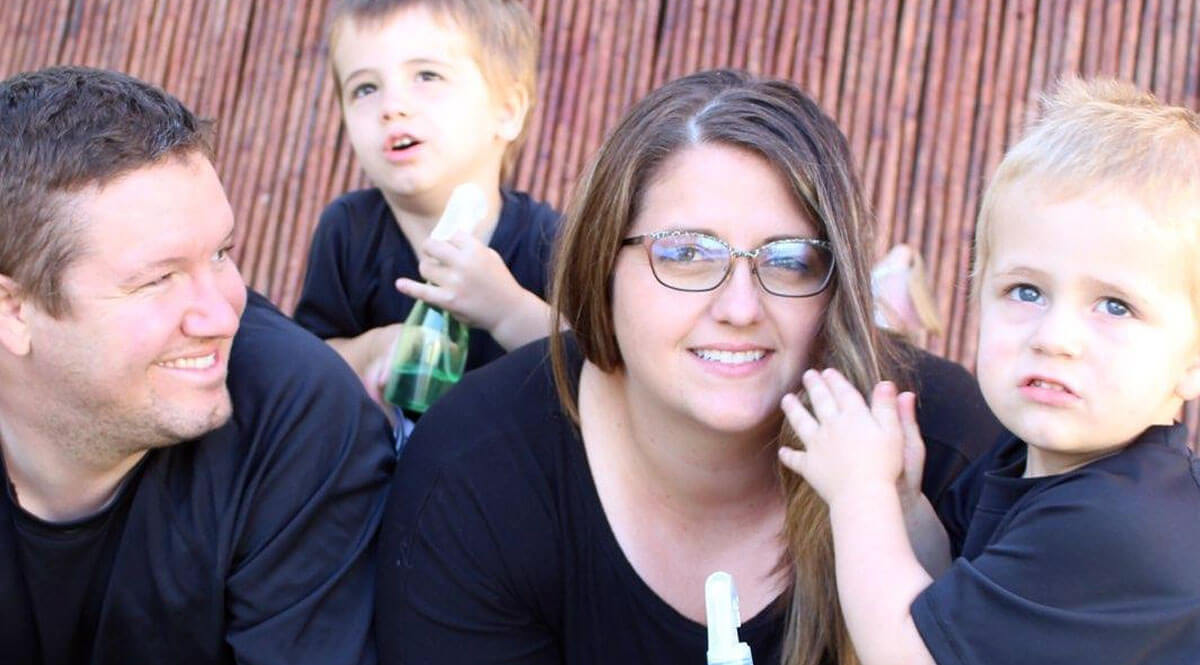
Parenting during a pandemic is tough! Trying to balance kids, household duties, careers, and in many cases, schooling or therapy, is more than a full-time job. Throughout the last couple months, however, we have witnessed glimmers of hope as some autism families used their creativity to find new ways to thrive during one of the most stressful moments in this lifetime.
Take Valerie and Logan, mom and dad to Logan Jr., age 4, and Levi, age 2. The brothers regularly attend Hopebridge Autism Therapy Center in Glendale, Arizona for applied behavior analysis (ABA therapy) and other complementary services. When the center temporarily closed in March 2020 due to shelter-in-place orders around COVID-19, Valerie and Logan immediately shifted gears to work alongside Hopebridge to make sure their children still had opportunities for therapy.
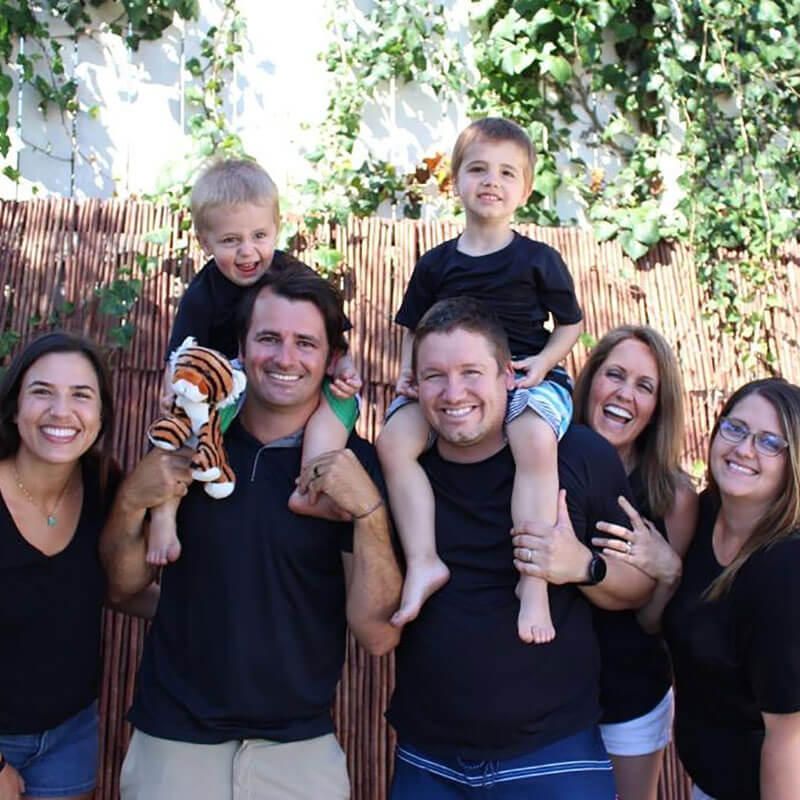
The parents had recently transformed their loft into an in-home classroom with two student desks, a calendar and materials geared toward therapy and academics. Their intent was to give their sons a special space to productively play when they came home from ABA therapy. During the pandemic, however, it took on a new role. This room enabled Valerie – who took a break from her day job as a nurse – to conduct direct therapy at home with help from their Board Certified behavior Analyst (BCBA). Together, they spent two to three days per week conducting teletherapy sessions, plus one more to focus on parent training.
“Telehealth was really eye-opening. I was able to view their family dynamic and behavior inside the home. I knew their mom was involved, but I didn’t know to what extent until we had to transition to virtual therapy,” said Hopebridge BCBA Olivia Shaw. “I knew she wanted to keep them engaged and on track with school preparation, so I coached her through programming to keep up their progress.”
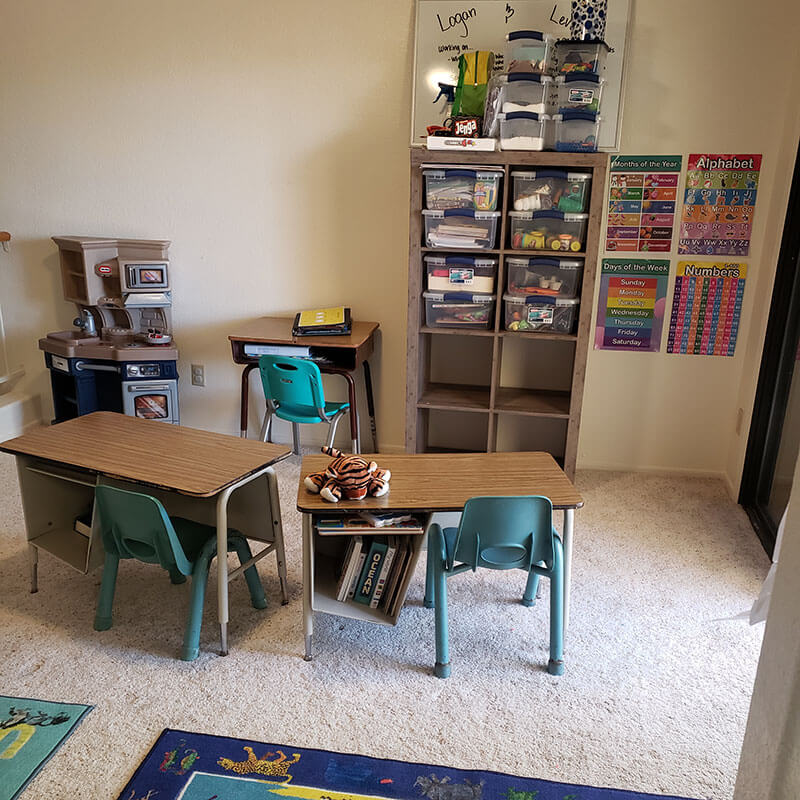
Throughout this time, Olivia worked with the family to build more structure within the home. Both Logan and Levi follow visual schedules for transitions, so she made pictures for all of the rooms and stations so they could continue to practice and understand where they were to move next. The first time Logan pulled out his book and pointed to his bedroom to indicate he wanted to go there, it was exciting for all of them.
“Olivia walked us through how to approach various goals and even coached me through tantrums and some of the more challenging moments.,” said Valerie. “One time, Levi was frustrated during pretend play. He banged his toy around so much I thought he would ruin it. Olivia explained he didn’t know how to play with it and guided me to show him how to use it. I did and it was like a lightbulb went off. It may seem easy to me, but he needed to learn in a different way, so I now try to keep this in mind with everything I do.”
Therapy efforts included programming around turn-taking, following directions, and integrating activities like circle time in a manner that worked for the family in this environment. Valerie also researched her own ways to keep the boys engaged, some of which worked so well that they are still in play back at Hopebridge now that it is open again for center-based therapy.
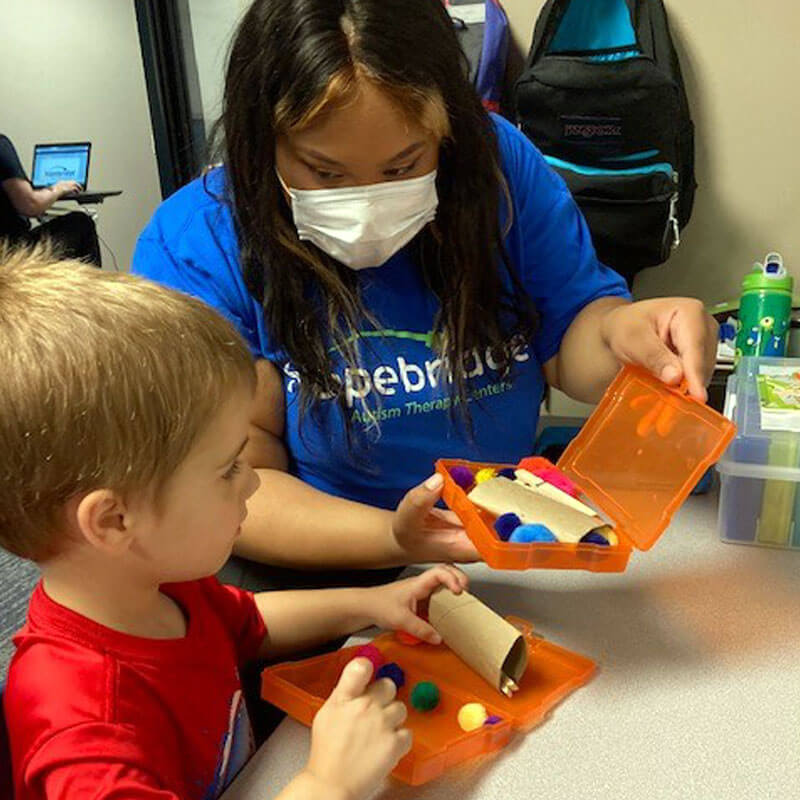
“It’s so refreshing to watch Valerie constantly come up with new ideas and ways to help her boys. During the temporary closure, she made task boxes for them and asked me about implementing a tool called, 8 the Plate, to assist with mealtime.” said Olivia. “When I mentioned what a great job she was doing, she responded, ‘I’ve only ever had kids with autism; this is the only way I know how to parent.’ I hope she gives herself the credit she deserves.”
While they still deal with coronavirus-related challenges – the brothers often compete for their parents’ attention and miss going to the playground – the family’s dedication and continued communication with Hopebridge kept regression to a minimum until the center reopened. It also laid the foundation for more productive play time at home for the future.
These sweet, energetic and lovable boys are happy to be back at Hopebridge since the reopening. Early intervention made a huge impact on Logan and is already having a big effect on Levi, so it was important to their parents that they continue full-time therapy.
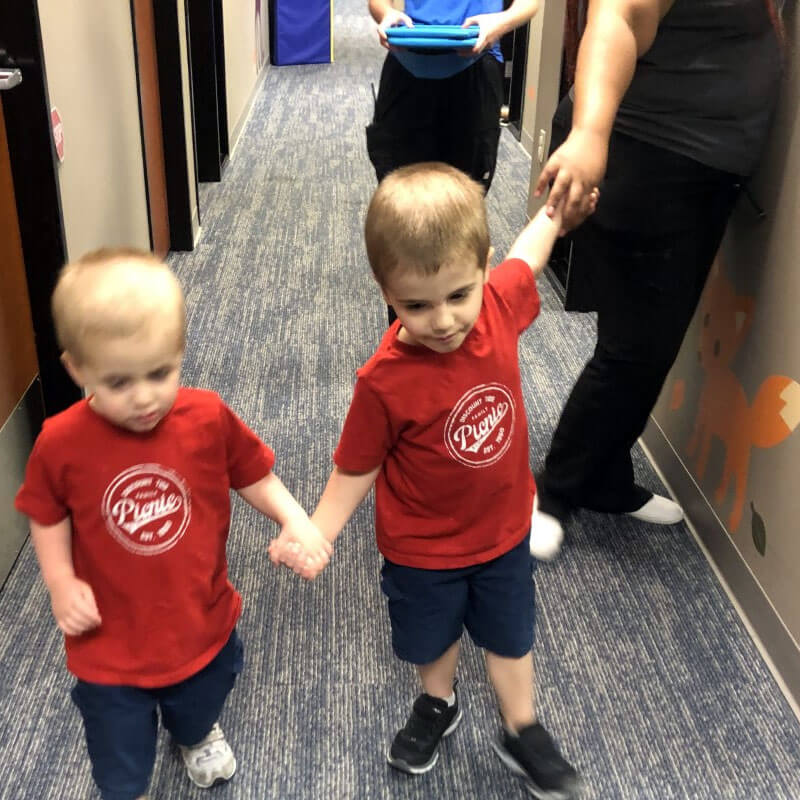
The family’s autism journey began nearly two years ago. Their oldest, Logan, experienced a speech delay and a few other developmental delays. He spoke only a handful of words at 2 years old, even with speech therapy, and did not always play with toys appropriately. Since his mother has a medical background as a nurse, she was aware of some of the signs of autism in Logan’s behaviors. They had him evaluated for autism spectrum disorder (ASD) and as soon as he received the diagnosis, they began searching for ABA therapy opportunities.
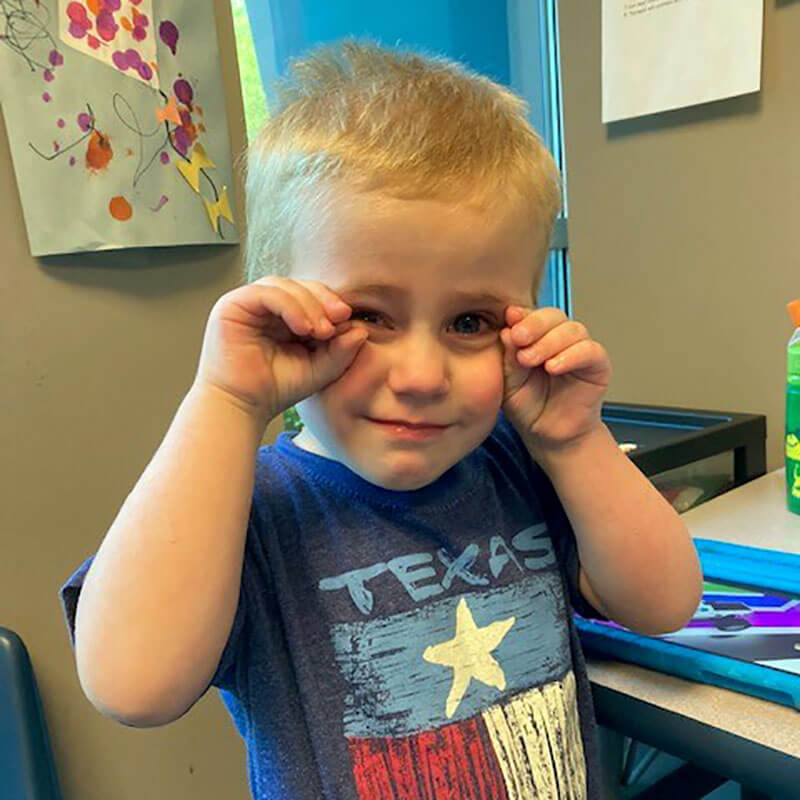
“I called all of the ABA providers in the Phoenix area. I interviewed each clinic that had openings, including Hopebridge, which was new to Arizona at the time,” said Valerie. “I instantly liked the Hopebridge facility and friendly team members, plus I was drawn to the idea of multidisciplinary therapy, which now includes occupational therapy. We jumped in and started as quickly as we could.”
Within a matter of months, Logan already knows the alphabet and can count to 30. He is more social and uses two- and three-word phrases like, “I want more,” “no more,” and “I’m all done.” He can sit at a table, work on tasks for longer periods of time, and is building more academic-readiness skills.
“ABA therapy at Hopebridge is the best thing that could have happened for Logan,” said Valerie. “He used to be so frustrated. Imagine going an entire day without speaking…that’s what life was like for him. Now he uses pictures and schedules to express himself. His meltdowns and other negative behaviors have significantly decreased since he has learned to communicate with us.”
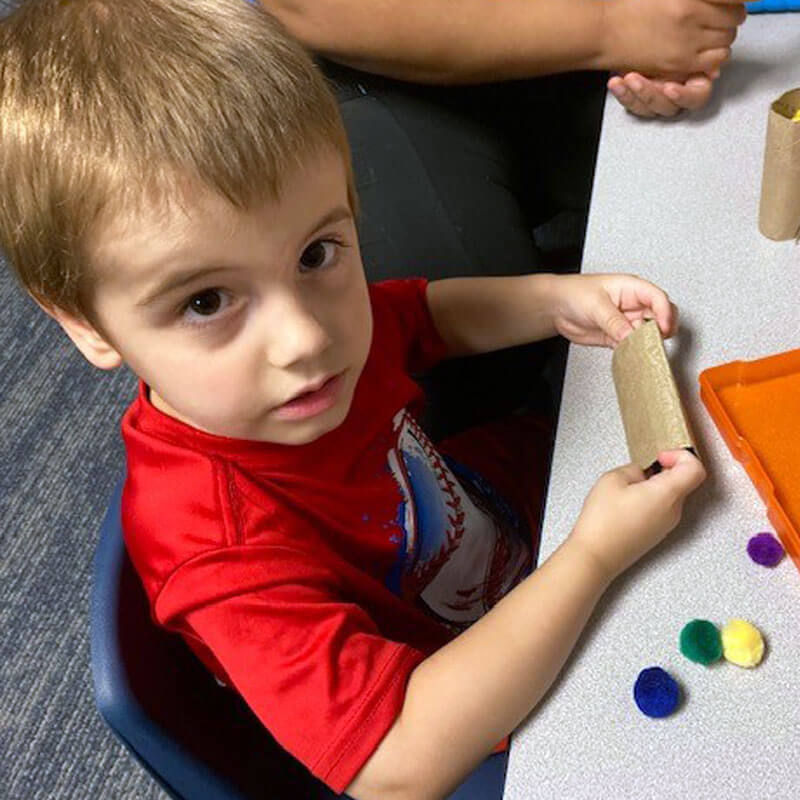
Valerie and Logan Sr. knew there was a high probability Levi would also have autism. Because he was so young when they started the diagnostic process, they went through three testing phases. All three confirmed his autism diagnosis. Completely non-verbal at the time, Levi began ABA therapy at Hopebridge two months after Logan. Within two more months, he was already repeating words.
Valerie told us she is excited to see them both blossom. She and her husband are excited to learn what their boys enjoy playing with and what makes them happy.
Always on the move, Logan is drawn to dinosaurs, sea creatures, cars, trucks and his current favorite, excavators. He has a kid-sized excavator to dig in the sand, and while Valerie says he ruined her garden, she loves to watch his joy while playing with it. His little brother is a bit more mellow and goes with the flow. He enjoys softer plush toys and sensory-seeking objects, especially a stuffed tiger he likes to hug. Both boys can spend long periods of time playing with sensory bins filled with water beads, sand, pretend snow and animals.
“Between the boys, their parents and me, I think we make a pretty good team! We communicate often and I enjoy connecting with them in this way,” said Olivia.
If your child displays symptoms of autism or has already been diagnosed with ASD, contact us at Hopebridge for an ABA or diagnostic evaluation. Like they did with Logan and Levi, our team wants to work closely with you to help your kiddo achieve more independence and a fulfilling life.
*Informed consent was obtained from the participants in this article. This information should not be captured and reused without express permission from Hopebridge, LLC. Testimonials are solicited as part of an open casting call process for testimonials from former client caregivers. Hopebridge does not permit clinical employees to solicit or use testimonials about therapeutic services received from current clients (Ethics Code for Behavior Analysts 5.07-5.08; BACB, 2020). Hopebridge does not provide any incentives, compensation, or renumeration for testimonials provided by a former client or client caregiver.